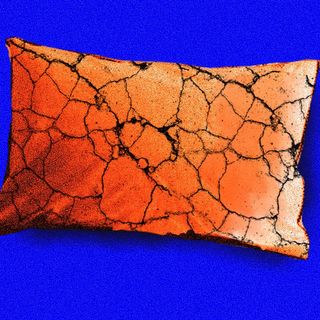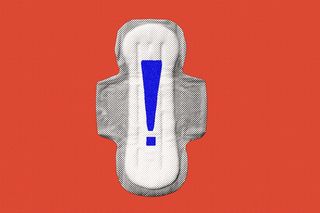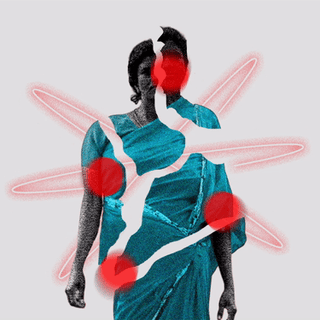
Many Popular Sanitary Pads in India Contain Cancer‑Causing Chemicals, Study Finds
The presence of harmful chemicals in pads is especially alarming since the vagina can absorb them at a much higher rate than, say, the skin.

A new report suggests that many of India’s most popular sanitary pads contain toxic chemicals that can induce severe health issues in consumers. This is creating furor among the country’s menstruating population.
Titled “Wrapped in Secrecy: Toxic Chemicals in Menstrual Products” — and conducted by Toxics Link, an environmental NGO — the research suggests that some of the most popular brands of sanitary napkins sold in India contain two harmful chemicals: phthalates and volatile organic compounds (VOCs). The researchers tested 10 brands, including Whisper, Stayfree, and Sofy, among the inorganic lot, and PeeSafe, Nua, and Plush, among organic pads. Both variants, unfortunately, tested positive for harmful chemicals.
“We found phthalates and VOCs to be present in all the pads that we tested,” noted Dr. Aakanksha Mehrotra, program coordinator at Toxics Link, who was involved in the study. “Most of these chemicals are added to make the pad more elastic. But, they are dangerous because they can cause problems like PCOS, endometriosis, hypothyroidism… They can change the hormonal functioning of the body. Phthalates leak out; they are not bound to the product they are added to.” Besides, long-term exposure to the chemicals can also lead to cancer.
The chemicals are also used to add fragrance to the products — guaranteeing “freshness” to consumers.
Related on The Swaddle:
Menstruating Students Shouldn’t Have to Miss Education Because Schools Lack Pads: Karnataka HC
The study, however, doesn’t endorse any particular type of menstrual hygiene product as a safer alternative. Priti Mahesh, the chief program coordinator at Toxics Link, told The Wire, “We never claimed if any other type of sanitary product is better than napkins. They may or may not contain chemicals — it is subject to further investigations.” Some experts suggest that cloth napkins and menstrual cups might be less-dangerous alternatives. However, given the lack of research into period products, one is bound to wonder: are they really?
Meanwhile, Dr. Mehrotra pointed out that surveys suggest sanitary napkins remain the preferred choice for menstrual hygiene among consumers — imperiling them without their knowledge. According to The Quint, in 2021, the sanitary napkin market in India was valued at around US$618.4 million.
The presence of harmful chemicals in sanitary pads is especially alarming since the vagina — being a mucous membrane — is highly permeable, and can absorb the toxins at a much higher rate than, say, merely the skin. “[The vagina] tends to absorb these chemicals very fast. As doctors, we use the vagina as a delivery route for hormones. So, imagine that if sanitary napkins have these chemicals, how fast they will get absorbed into the body. The phthalates and VOCs mentioned in the study can cause severe reproductive toxicity and behavioral disorders,” cautioned Dr. Uma Vaidyanathan, a gynecologist at Fortis Hospital, Shalimar Bagh, adding that the skin in the vaginal area is “very thin and sensitive.”
What’s also jarring is how long it has taken us to discover that even organic pads — which have long been promoted as the “safer,” “more responsible” choices — are equally unsafe. However, given that periods are largely considered a “women’s problem,” and medical science, too, has routinely ignored women’s health, it’s hardly surprising that research on the subject has only emerged now. After all, it took thousands of women to experience disruptions in their periods, and experts to question data gaps and advocate for deeper investigations, before scientists studied the impact of Covid19 vaccines — and the infection itself — on people’s mental health.
Related on The Swaddle:
In Conversation: On the Official Who Dismissed a Girl’s Request for Free Sanitary Pads
Mahesh says that even though alternatives to phthalates are “most conveniently available, since there is no regulation, there has been no effort from the industry to look at other options.” It’s unnerving — but again, hardly shocking — that companies behind the napkins would rather spend their money advertising pads than fund research to assess their safety.
Mahesh’s statement also suggests a lack of regulations to create — and, then, maintain — safety standards for menstrual hygiene products in India. “Our findings clearly indicate that it is high time that the government frames standards to this effect and make them mandatory,” Mahesh added. “But to do anything of that sort, the government has to first conduct a study. Our study tested for only two chemicals and for certain products. The government will need data for all chemicals and across all sanitary products… Producers must be mandated to provide relevant information and adequate warnings so that the risks can be assessed.”
In other words, the findings have brought to light a culture of systemic disregard for the health of the menstruating population.
As Mahesh argued, “People who use menstrual products available in the market deserve access to safe products and the right to know what ingredients they are exposed to.”
Devrupa Rakshit is an Associate Editor at The Swaddle. She is a lawyer by education, a poet by accident, a painter by shaukh, and autistic by birth. You can find her on Instagram @devruparakshit.
Related


Can Changes in Weather Really Make People Fall Sick?
